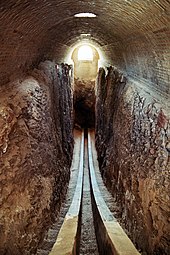정확한 과학
Exact sciences정확한 수학적 과학이라고도[1] 불리는 정확한 과학은 "결과에 있어서 절대적인 정밀도를 인정하는" 과학들, 특히 수학적 과학들이다.[2] 정확한 과학의 예로는 데카르트, 라이프니츠, 칸트 등 많은 철학자들이 논리 실증주의자에 이르기까지 합리적이고 객관적인 지식의 패러다임으로 삼았던 수학, 광학, 천문학, 물리학 등이 있다.[3] 이러한 과학은 고대에서[4][5] 현대에 이르기까지 많은 문화권에서 행해져 왔다.[6][7] 수학과의 연관성을 고려할 때 정확한 과학은 정확한 양적 표현, 정밀한 예측 및/또는 정량화된 예측과 측정을 포함하는 가설을 시험하는 엄격한 방법들로 특징지어진다.
정량적 정확과학과 사물의 원인을 다루는 과학의 구분은 수학을 자연철학과 구별하고 정확한 과학을 "수학의 가지에서 더 자연스럽다"[8]고 여긴 아리스토텔레스 때문이다. 토마스 아퀴나스는 천문학이 지구의 구형 형태를 수학적인 추리로 설명하는 반면 물리학은 물질적인 원인에 의해 설명한다는 점을 지적하면서 이러한 구별을 채용했다.[9] 이러한 구별은 17세기의 과학혁명까지는 널리 받아들여졌지만 보편적으로 받아들여지지 않았다.[10] 에드워드 그랜트는 새로운 과학으로 이어지는 근본적인 변화는 케플러, 뉴턴 등에 의한 정확한 과학과 물리학의 통일이며, 그 결과 자연현상의 물리적 원인에 대한 정량적 조사가 이루어졌다고 제안했다.[11]
참고 항목
| Wikiquote는 다음과 관련된 인용구를 가지고 있다: 정확한 과학 |
참조
- ^ Grant, Edward (2007), A History of Natural Philosophy: From the Ancient World to the Nineteenth Century, Cambridge: Cambridge University Press, p. 43, ISBN 9781139461092
- ^ "Exact, adj.1", Oxford English Dictionary, Online version (2nd ed.), Oxford: Oxford University Press, June 2016
- ^ Friedman, Michael (1992), "Philosophy and the Exact Sciences: Logical Positivism as a Case Study", in Earman, John (ed.), Inference, Explanation, and Other Frustrations: Essays in the Philosophy of Science, Pittsburgh series in philosophy and history of science, 14, Berkeley and Los Angeles: University of California Press, p. 84, ISBN 9780520075771
- ^ Neugebauer, Otto (1962), The Exact Sciences in Antiquity, The Science Library (2nd, reprint ed.), New York: Harper & Bros.
- ^ Sarkar, Benoy Kumar (1918), Hindu Achievements in Exact Science: A Study in the History of Scientific Development, London / New York: Longmans, Green and Company
- ^ Harman, Peter M.; Shapiro, Alan E. (2002), The Investigation of Difficult Things: Essays on Newton and the History of the Exact Sciences in Honour of D. T. Whiteside, Cambridge: Cambridge University Press, ISBN 9780521892667
- ^ Pyenson, Lewis (1993), "Cultural Imperialism and Exact Sciences Revisited", Isis: 103–108, doi:10.1086/356376, JSTOR 235556,
[M]any of the exact sciences… between Claudius Ptolemy and Tycho Brahe were in a common register, whether studied in the diverse parts of the Islamic world, in India, in Christian Europe, in China, or apparently in Mesoamerica.
- ^ Grant, Edward (2007), A History of Natural Philosophy: From the Ancient World to the Nineteenth Century, Cambridge: Cambridge University Press, pp. 42–43, ISBN 9781139461092
- ^ Aquinas, Thomas, Summa Theologica, Part I, Q. 1, Art. 1, Reply 2, retrieved 3 September 2016,
For the astronomer and the physicist both may prove the same conclusion: that the earth, for instance, is round: the astronomer by means of mathematics (i.e. abstracting from matter), but the physicist by means of matter itself.
- ^ Grant, Edward (2007), A History of Natural Philosophy: From the Ancient World to the Nineteenth Century, Cambridge: Cambridge University Press, pp. 303–305, ISBN 9781139461092
- ^ Grant, Edward (2007), A History of Natural Philosophy: From the Ancient World to the Nineteenth Century, Cambridge: Cambridge University Press, pp. 303, 312–313, ISBN 9781139461092



